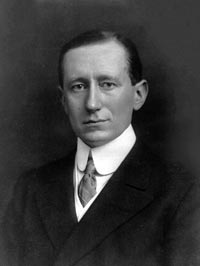
| Born: Apr 25, 1874 in Palazzo Marescalchi, Bologna, Italy |
| Died: Jul 20, 1937 (at age 63) in Rome, Italy |
| Nationality: Italian |
| Famous For: Radio |
| Awards: Nobel Prize for Physics (1909) |
Guglielmo Marconi was born on April 25th, 1874 in Bologna, Italy. His father was an affluent Italian land owner named Giuseppe Marconi. Marconi was first taught privately by Leghorn and Florence at Bologna. He then joined the University of Bologna. As early as 1890, his interest in physics, especially on wireless network communication, became quite evident. He studied the early mathematical works of Clerk Maxwell, the experiments of Heinrich Hertz and a research on lightning and electricity by Sir Oliver Lodge.
Achievements and contributions
Guglielmo Marconi made quite remarkable advancements that impact us to this day. His inventions and discoveries helped to create the radio, television and radar of today. Marconi believed that communication among people was possible through a wireless radio signal. His determination in this field brought about his greatest successes.
In late 1894, Marconi began conducting experiments in his father’s home in Pontecchio, Italy, inspired by the knowledge he had gained by studying Heinrich’s research. He applied Hertzian waves in his experiments to transmit messages over short distances, wirelessly. He essentially improved Hertz’s invention. Marconi progressively increased the distance between the points for signal reception and transmission to relatively longer distances. It is also during this period that he performed simple experiments that involved the use of reflectors to concentrate radiated electrical energy.
As early as the summer of 1895, Marconi accomplished a signal reception and transmission distance of approximately 1.25 miles. It is interesting to note that the success of his tries were signified by waving a white handkerchief. This advanced to the need for a firing a gun as the distances increased.
In 1896, he took his apparatus to England where he was introduced to the engineer in chief of the post office, Sir. William Preece. Later in the year, Marconi was granted a patent for his successful creation of a wireless telegraph. This motivated him to form his own company in 1897.
Marconi successfully proved that wireless waves were not affected by the earth’s curvature. Obsessed with the idea of sending messages across long distances, Marconi built a giant powerful transmitter in late 1901 to transmit the first wireless signals across the Atlantic, between Newfoundland and Cornwall; a distance of over 2,100 miles.
He managed to successfully send and receive signals across the Atlantic and the news of this achievement spread across the world. The majority of other outstanding scientist, including Thomas Edison, applauded Marconi. This achievement disapproved the dominant believe that the earth’s curvature affected the transmission of wireless signals. As a result, Marconi received many honors including the Nobel Prize for Physics in 1909.
Later Life and Death
Guglielmo Marconi was appointed as a Lieutenant in the Italian Army in 1914 and later as a captain and commander in the Navy. In 1919, he received an Italian military medal for his war service. During his service in the military, Marconi continued with his experiments establishing the world’s first radiotelephone link in 1932 and later a microwave beacon for ship navigation. On July 20th, 1937, Marconi died following a series of heart attacks.